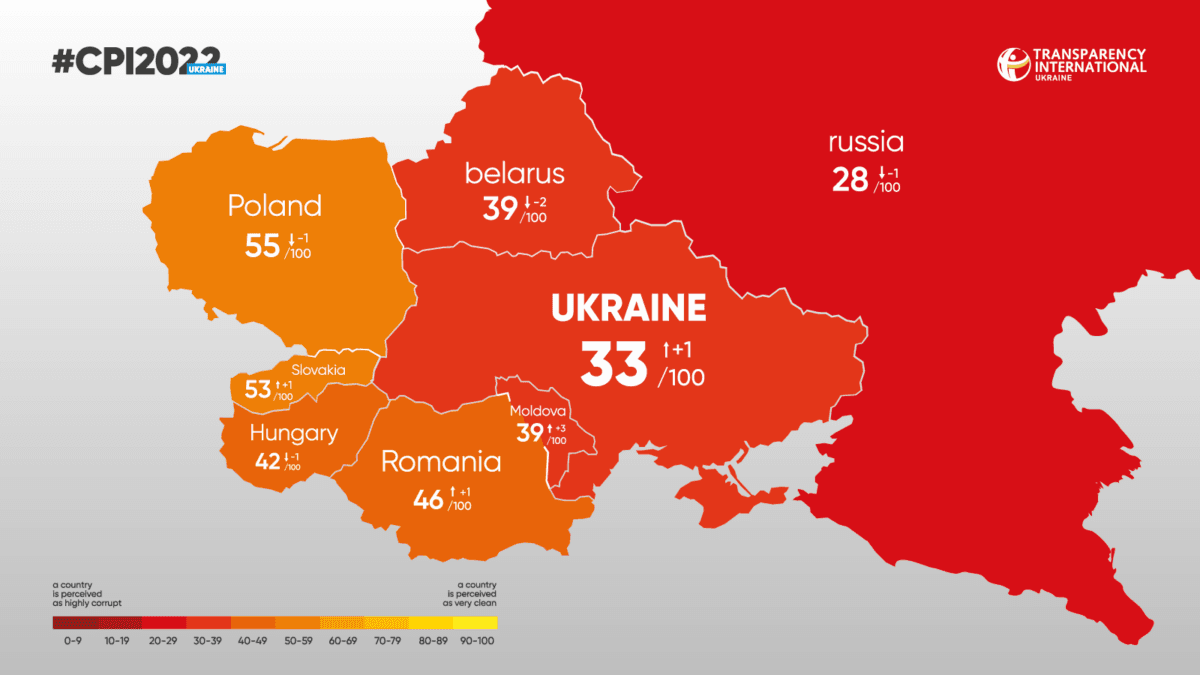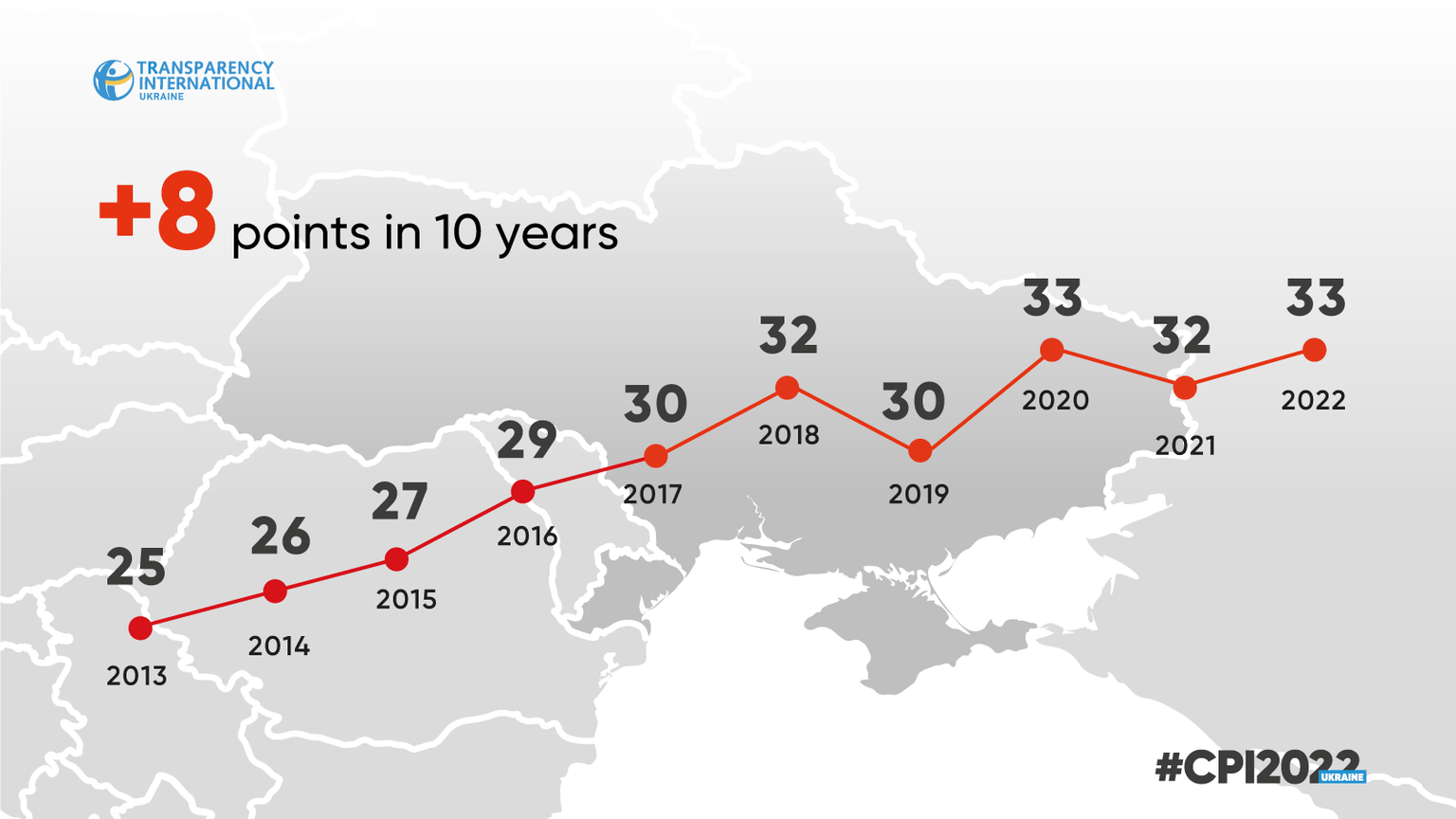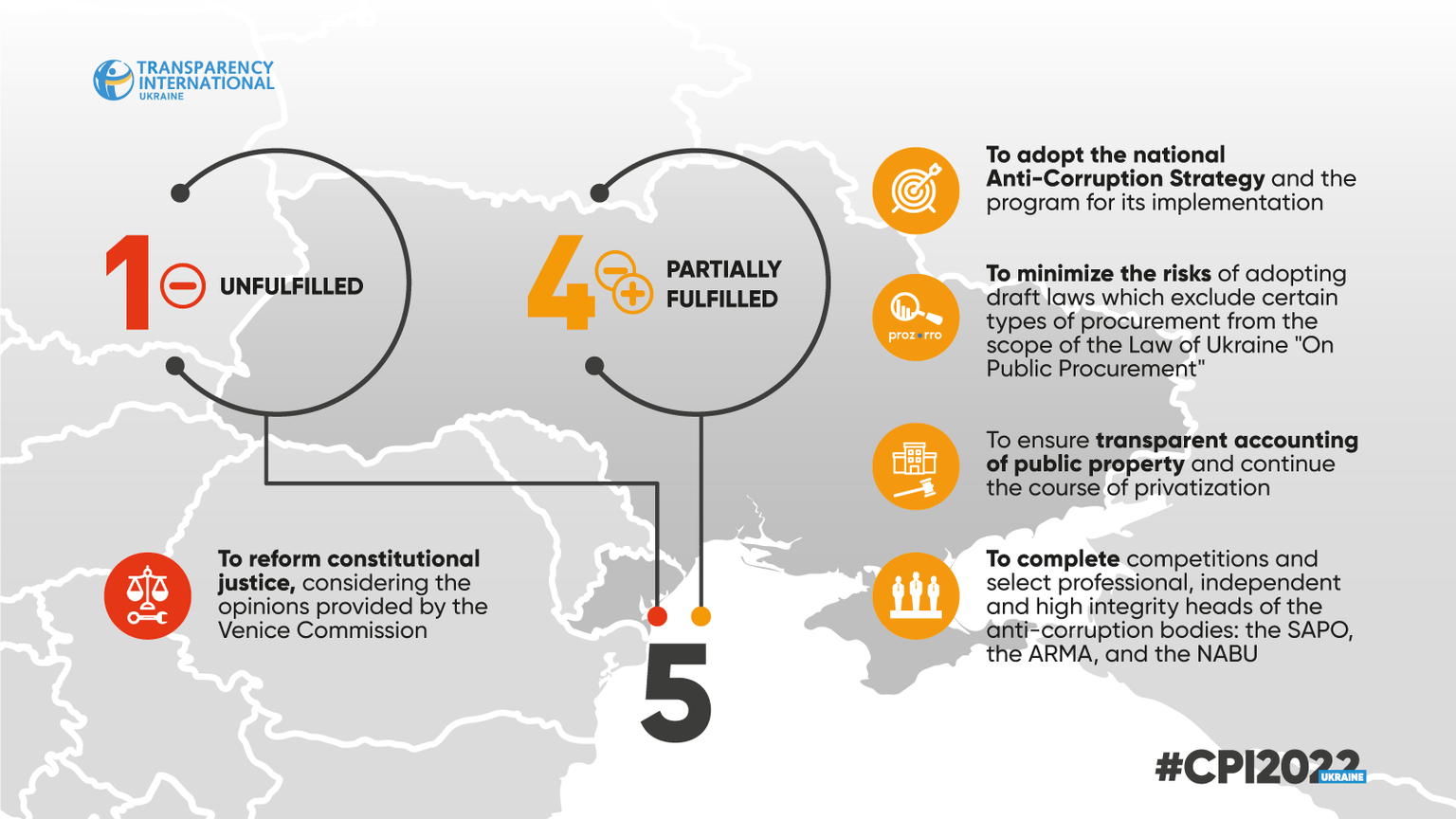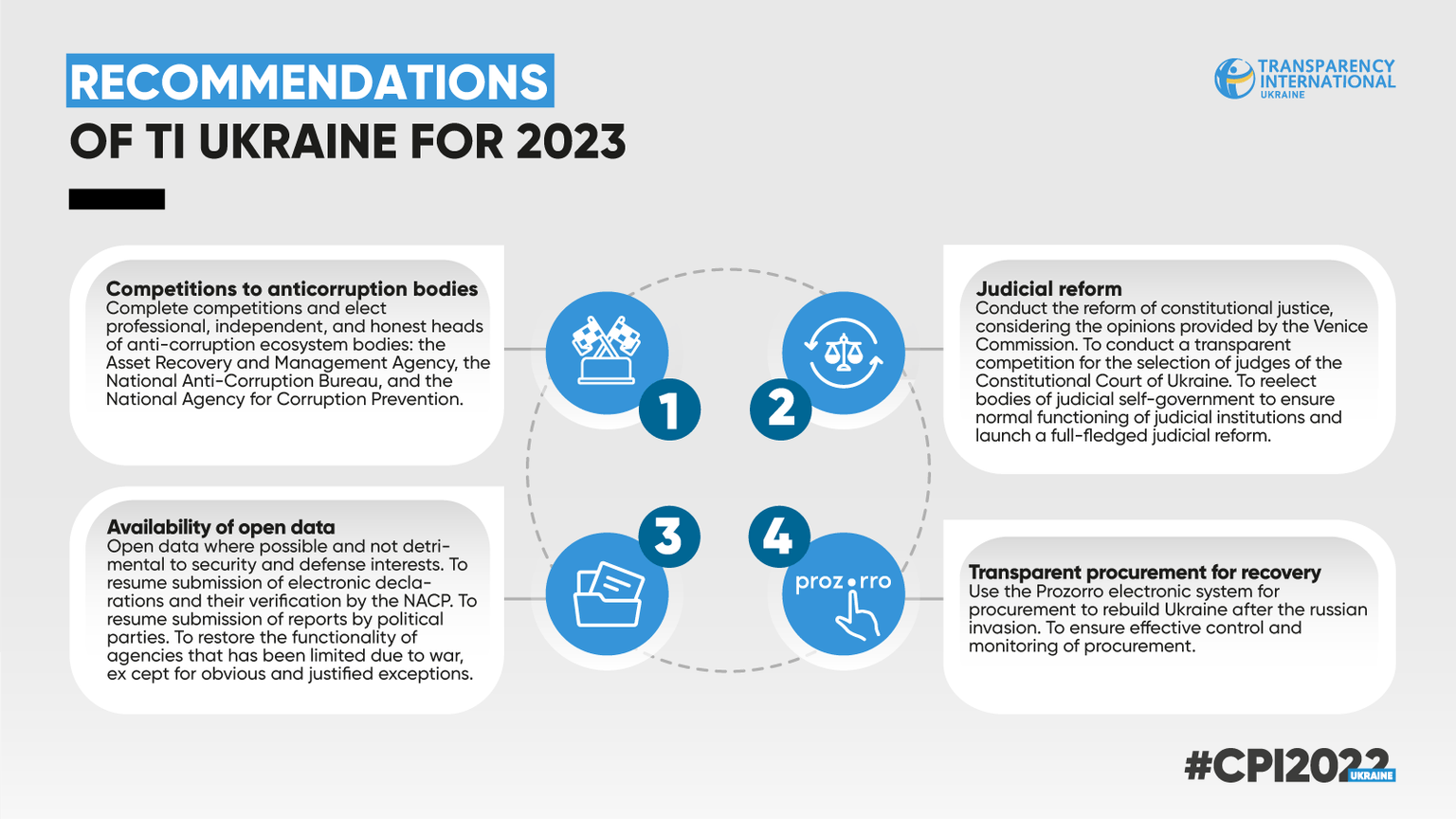Andrii Borovyk: Ukraine's Corruption Perceptions Index results and what world can expect going forward

Editor’s note: The opinions expressed in our op-ed section are those of the authors and do not purport to reflect the views of the Kyiv Independent.
Today, the results of the Corruption Perceptions Index (CPI) for 2022 have been published. Ukraine received 33 points out of 100 possible. Our score has increased by one point, and now Ukraine ranks 116th out of 180 countries in the CPI.
This year's corruption perception survey came amid high-profile arrests that rocked Ukraine in the first month of the year. After all, this is the hunt for the corrupt senior officials that Ukrainian society has longed for.
Anti-corruption institutions work steadily, despite the continuity of Russia's ongoing war, and do it quite effectively. But we have to admit, they still have a lot of work to do.
What influenced the Ukrainian results in the new CPI, how did the fight against corruption take place during the war, and what are the prospects of our country?
Let's discuss this in detail.
War and anti-corruption. What do CPI results mean?
Ukraine has shown stable growth within the last 10 years.
During this time, we added 8 points to our score. Yes, it is difficult to call this a surge, but it can definitely be considered a confident movement forward.
We need to remember that the one point we added was following the results of the most difficult year in the history of our country.
Today, we tied our all-time highest score in the Index, according to the new methodology (the same was in 2020, but you must agree, the circumstances were entirely different back then).
Since the time of corrupt pro-Russian ex-President Viktor Yanukovych and his associates, who actually turned the institution of power into a criminal group to steal state money, we have made a very tangible step forward.
Just look back on the times before the EuroMaidan Revolution, when all information was closed, officials filed printed asset declarations as they pleased, and procurement took place on paper behind closed doors — this was the reality in which the country lived 10 years ago.

And over this decade, not only have we emerged as a state, but we also created a number of leading electronic tools (Prozorro, the Prozorro.Sale e-declaration system, E-health) and built the country's anti-corruption infrastructure from scratch.
It should also be understood that since it is the perception of corruption that is measured, and not its actual level (it cannot be measured), the situation with a sharp increase is rather extraordinary than expected, especially in the midst of a long war.
The course of modernizing the state and restoring order can be seen from how the current personnel improves the already existing elements of the state system, or at least not worsen them.
Here is just a brief analysis of what was implemented based on our recommendations in 2022 and what might have influenced our score in this year's CPI.
● The completion of the competitions to anti-corruption infrastructure bodies – partially implemented
The Specialized Anti-Corruption Prosecutor's Office head was finally appointed during the summer, which added power to the anti-corruption infrastructure.
The competition in which the National Anti-Corruption Bureau Director is to be elected is moving ahead.
However, electing the head of the Asset Recovery and Management Agency is still stalled.
This is bad because one of the agency's specialties is the manage seized Russian assets, and the presence of an effective and honest leader would improve the situation.
● Adoption of the Anti-Corruption Strategy and its implementation program — partially implemented
There is finally a strategy, but there is no state anti-corruption program to implement it.
The public calls on the government to finally approve it and not consider dubious changes from bodies that want to protect dubious practices.
● Continuation of privatization — implemented. Ensuring transparent accounting of public property — not implemented
And if everything is clear and positive with the former, then as far as the latter is concerned, Ukraine definitely needs to change the legislation to strengthen control over the data on property possessed.
● Public procurement oversight — partially implemented
The January scandal with overpayments on food procurement for the military is an example of the abuse of simplifications in the procurement procedure that took place during the war.
Appealing to the issue of security and urgency since Russia launched its full-scale invasion, procuring entities can sign direct agreements and not publish them online.
As we can see, it's pretty harmful. Thus, the visibility and transparency of procurement need to be restored.
● Reform of the Constitutional Court — not implemented
Despite the opinion of the Venice Commission and the indignation of public experts, President Volodymyr Zelensky did sign law 7662.
This law not only can raise doubts about the results of the work of the Advisory Group of Experts, which will elect the Constitutional Court judges but also allow dishonest judges to be elected to this crucial institution.
Unless the situation changes, this is a direct path to establish full government control over the Constitutional Court.

What Are the Prospects?
It should be noted that some of these recommendations were implemented under martial law — it was in 2022, the new head of the Specialized Anti-Corruption Prosecutor's Office head was appointed, and the Anti-Corruption Strategy for 2021-2025 was adopted, albeit without several important provisions.
However, the war still made it somewhat difficult to fight corruption.
Since the beginning of the full-scale invasion, the whole country has experienced a great shock. This concerned not only people but also state institutions.
From the first days of the war, all information was concealed. When the first shock passed, access to the data gradually began to be restored, but so far, this is not enough.
Yes, the war posed the most important challenge to Ukraine — survival. And we coped with it.
Our defenders have shown the entire world that they are not only able to resist the enemy but also are far superior to them in the strength of will, dedication, and professionalism.
However, at the same time, Russia's armed aggression exposed other challenges, in particular, it pointed to the need to continue overcoming the internal enemy — corruption.
It is sometimes visible at the local level — yes, even during the war, there are people who can use this bitter time to their advantage.
But the January wave of corruption scandals will most certainly discourage officials from participating in schemes and taking bribes. Our anti-corruption system shows that punishment will certainly catch up with the dishonest.
The anti-corruption ecosystem has survived, surrounded by Russian troops and under massive shelling, but that doesn't mean it's working at full capacity.
We still have a long way to go.

Namely to complete the competitions for the heads of the National Anti-Corruption Bureau and the Asset Recovery and Management Agency and choose professional, honest, and, most importantly, independent leaders.
To consider all previous shortcomings and start a competition for the head of the National Agency on Corruption Prevention (the next head should be appointed in January 2024). This will greatly strengthen the capacity of the anti-corruption infrastructure.
We must also open up databases where it is possible and doesn't harm our security and defense interests.
And to restore accountability of all authorities – submission of financial reports of political parties and electronic declarations and their verification by the National Agency on Corruption Prevention.
We must understand that not only the results of the Corruption Perceptions Index but also the effectiveness of the reconstruction of our country and the success of future European integration depend on the transparency and accountability of the authorities and the effective work of our anti-corruption institutions.
We, as a country, chose our path a long time ago, and this is the choice our defenders and every Ukrainian bravely fight for every day.









